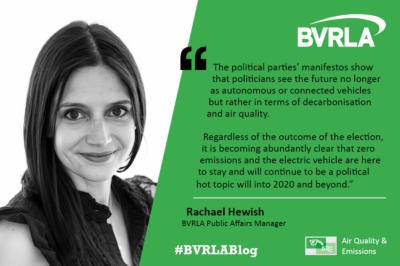BVRLA’s Public Affairs Manager Rachael Hewish shares some insights from the main political parties’ manifestos ahead of the upcoming general election.

We are now well and truly in the middle of general election fever. Almost all the political parties have shared their manifesto promises and you can’t open a newspaper without the latest bizarre photo opportunity or foot-in-mouth moment being plastered across the front page.
It’s fair to say that coming into this election, we voters have one of the widest selections of political ideologies to pick from for over a decade. There are; however, some very strong themes emerging consistently across the political spectrum. Dig a bit deeper, past the Brexit soundbites, and all the parties are racing each other to zero emissions, they just each have a slightly different take on how to get there.
The Liberal Democrats, Labour and the Green party are all aiming to stop the sale of new petrol and diesel cars by 2030, and the Conservatives have promised to consult on the earliest date these sales could be phased out as well. The parties are also all vying to be the most supportive of electric vehicle (EV) uptake. The Conservatives have promised to ensure everyone is within 30 miles of a rapid electric charging station, Labour will invest in EV charging infrastructure and electric community car clubs, the Liberal Democrats want to cut VAT on EVs to 5% and the Greens have promised charging points at all existing petrol stations and motorway service stations by 2025.
Similarly, all the parties are concerned about the quality of the air we are breathing, with a variety of promises floated from extending the Clean Air Zones and ultra low emission zones to setting new targets for a post-Brexit UK.
It is clear politicians see the future no longer as autonomous or connected vehicles but rather in terms of decarbonisation and air quality. It mirrors what we’ve been hearing from our own engagement with government and policymakers ahead of the election, and it is precisely why the BVRLA’s own manifesto, launched at the start of November, is heavy on recommendations for supporting the Road to Zero and tackling air quality and emissions today. It’s also why we’ve been inviting organisations to sign our joint letter on the future of the Plug-In Grant which will be sent to the leaders of each of the main political parties ahead of polling day on the 12 December.
As we approach the end of the election campaign, our focus too will turn to the future for electric vehicles, with a dedicated expert panel session at the BVRLA’s Industry Outlook Conference on the topic.
Regardless of the outcome of the election, it is becoming abundantly clear that zero emissions and the electric vehicle are here to stay and will continue to be a political hot topic well into 2020 and beyond.
You can read a useful summary of the political party manifestos as well as take advantage of the BVRLA’s campaign resources on our General Election 2019 webpage.





